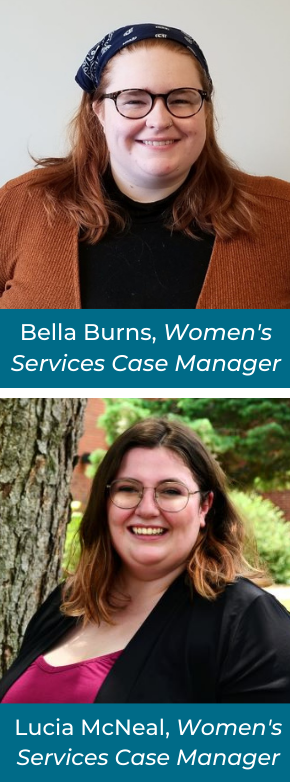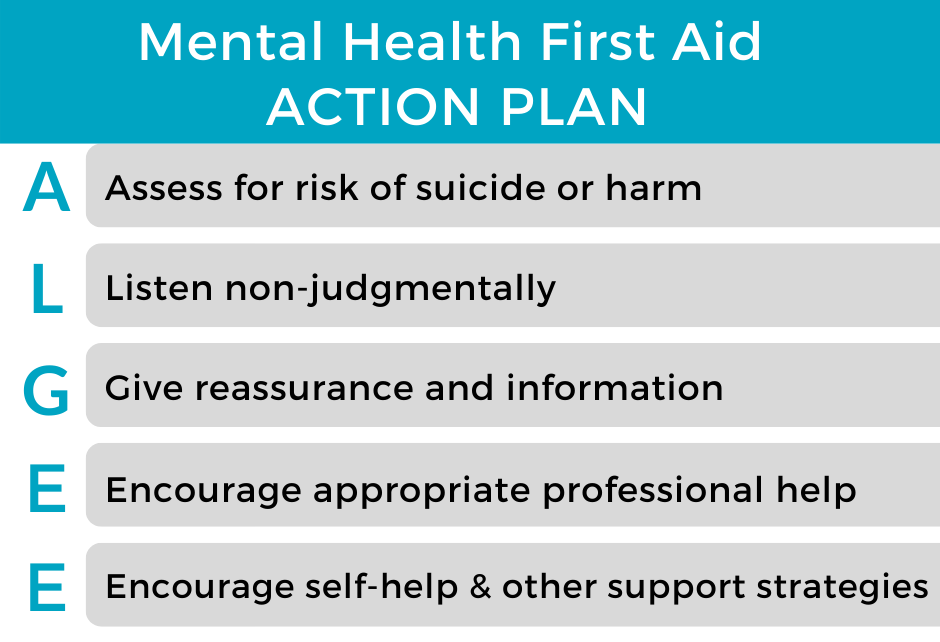Have you or someone you cared about ever experienced a panic attack, and you didn’t know what to do? Most people will experience a time in their lives where life has become overwhelming, and the body and mind begin to respond in ways that can be confusing for both the individual experiencing the symptoms, but also for those of us who care about the individual who is struggling.
Many have gone through CPR training or first aid training to help someone in physical danger or injury, but what should we do when someone is having a mental health crisis? What signs and symptoms should you look for?

To further develop their expertise in supporting individuals with mental health and substance abuse concerns, Women’s Services Case Managers at CMC, Bella Burns and Lucia McNeal, completed the Mental Health First Aid training at the Abbe Mental Health Center.
Through this training, Bella and Lucia learned tips on what to do when someone is experiencing a mental health crisis, and also gained tips on what not to do. Below, they share some of the key takeaways from the training that have helped inform their work as case managers, as well as helpful tips for anyone who may be experiencing or responding to a mental health crisis.

The first tip is to remember the acronym ALGEE. Mental Health First Aid teaches participants a five-step action plan, ALGEE, “to use when providing support to someone who may be experiencing a distressing situation, just as you would if you were administering first aid for a fall.”
What are everyday signs that someone, including ourselves, is in struggle with their mental health?
A person may be struggling with disordered eating, like not eating for hours or unable to stop eating, sleep disturbance, anger that doesn’t match a given situation, missed deadlines, and lack of concentration. Another person may be experiencing withdrawn behavior, emotional outbursts, lack of personal hygiene, and no interest in their usual activities. Sometimes these changes can be subtle and can look different from person to person. It is important to always respond to others and ourselves with compassion and understanding, and to look at the person, and the reasons why they may be struggling.
How do we recognize someone is in crisis?
Someone may be at a breaking point, feeling hopeless, experiencing dark thoughts that nothing will ever get better, or any number of things. But it’s helpful to know what symptoms to look for that can be seen from the outside as clues that someone may be in crisis, such as:
- Agitated behavior
- Panic attacks
- Shortness of breath
- Paranoia, feelings of surveillance
- Irritability, rage attacks, anger outbursts
- Sentences that don’t make sense and are hard to follow
- Unaware of what day or year it is
- Unable to use logic to think through what they are experiencing
- Acting in ways they would not usually act, and unable to calm themselves down
You’ve identified that someone is in crisis –now what?
Bella and Lucia shared from professional experience, strategies that could be both helpful and unhelpful to someone in crisis. While it’s difficult to plan for every situation, here are some tips they shared:
- Keep your cool
- Try to look at the person with empathy
- Listen to what that person is saying
- Monitor yourself and how you are doing
- Be aware of what your resources are
- Stay with them while they are in distress
- If you must leave, ask if they are comfortable with you contacting someone for them, and remain with them until someone else can come help if it’s safe to do so
- Speak in calm tones
- Realize that now is not the time to try to be relatable
- Understand that saying things like “it’s going to be okay” can be unhelpful
- Better things to say are “I’m here, I’m listening, I care about how you’re feeling and what you’re going through.”
What are some ways our community can support mental health first responders?
Being a mental health first responder is both exhausting and rewarding, and has the capability to save lives. But how can we help ‘the helpers’? “I wish people knew more about secondary trauma and how it is different than burnout,” Lucia shared. “Being a crisis responder, the situations replay over and over in your head, just like anyone doing front line work. Just because first responders know how to do this work does not mean we are invincible.”
Social workers and case managers are only human, after all, but they play a very important role in the work at CMC. Take time out to thank a provider, a friend, or someone you know who supports others! Care for yourself, and find ways you can prepare to help someone else. We can help share the burden of care by educating ourselves, taking action, and being prepared!
Mental Health First Aid is a nationally acclaimed program, available through the National Council for Mental Wellbeing and the National Alliance on Mental Illness. Folks who are interested in becoming an instructor can find more information here.

